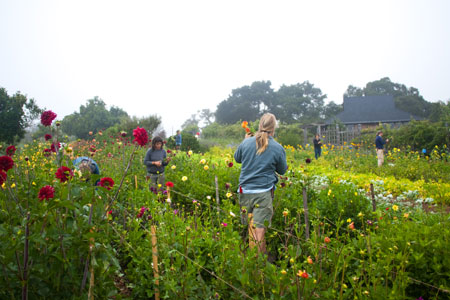The Center for Agroecology and Sustainable Food Systems, a hub of innovation in sustainable agriculture and food systems research for decades, is embarking on a year-long effort to review and refresh its programs.
Widely recognized for pathbreaking scholarship and hands-on training, the center has evolved from a grassroots gardening program to a full-fledged research and advocacy endeavor. CASFS has helped shape the national conversation about agroecology, food insecurity on college campuses, social justice in the food system, and more. Staff and faculty affiliates will spend the coming year assessing how the center can keep pushing the food movement forward, executive director Daniel Press said.
“The landscape has changed dramatically over the past 50 years, and even in the past decade," said Press. “Our challenge is to think critically about our future and position ourselves to remain a leader for decades to come."
To provide faculty and staff with the opportunity to thoughtfully craft a vision for the decades ahead, the center will also take a year off from its renowned Apprenticeship in Ecological Horticulture, an intensive six-month residential program that enrolls 39 people each year.
The curriculum of the apprenticeship, which began in 1973, has evolved over the years to incorporate community-supported agriculture and issues of social justice and worker welfare, but Press said it’s time for a deeper review of what the program offers and how its delivered.
“This pause will give us the opportunity to evaluate how we want to grow and change to meet the needs of the 21st century food system,” he said.
The center plans to continue all its other programs in the year ahead, including cutting-edge research, undergraduate courses and internships, offering community workshops, growing food for dining halls and campus food pantries, hosting the annual Harvest Festival, and much more.
Press, a professor of environmental studies who was appointed CASFS executive director in 2012, will step down as director this fall, though he will continue as associate dean for the Division of Social Sciences. Stacy Philpott, a professor of environmental studies and the Alfred & Ruth Heller Chair in Agroecology, will take over in October.
Expanding role
The UC Santa Cruz Farm and Garden is an important part of the campus’s efforts to address food insecurity among students, and Philpott said she wants to develop new ways to increase its support for undergraduate and graduate students.
“We want to make sure our students have access to fresh, local, and healthy food, as well as the opportunity to learn more about our food systems,” Philpott said. “Our students care deeply about social justice and the environment, both of which intersect with how our food is produced."
A 2016 UC study that found 19 percent of students reported they sometimes had gone hungry during the year. Another 23 percent said they had limited access to a variety of good-quality food because of a lack of money.
Last year, the center installed four “hoop houses” that allow the UC Santa Cruz Farm and Garden to provide a year-round supply of healthy produce to dining halls, food pantries, and pop-up markets on campus.
The Farm and Garden also provides fresh produce to the Cowell Coffee Shop for the Peoples, an innovative nontransactional food store and cafe that opened last year. The cafe is helping to address food access issues among students by providing food free of charge.
A new major in agroecology being developed by the Environmental Studies Department will further expand student involvement in the center. While still under review, the major may launch as early as fall 2020, according to Philpott.
“CASFS has been a national leader in the progress we’ve made toward building a healthy and just food system,” Philpott said. “There's more to do, and CASFS will continue leading us forward.”




